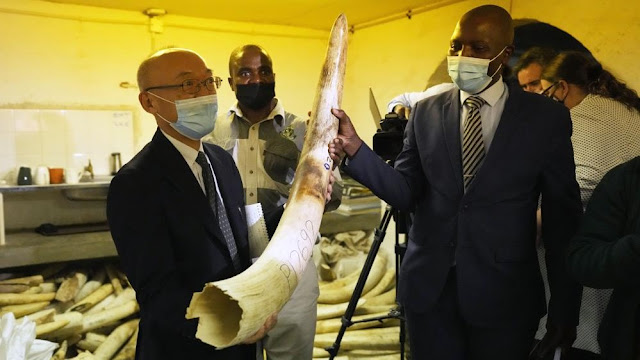Harare, Zimbabwe: The landlocked country of southern Africa is seeking international support to be allowed to sell its stockpile of seized ivory, worth over $600 million, for the conservation of its rapidly growing elephant population which it describes as “dangerous.”
Zimbabwe National Parks and Wildlife Management Authority officials showed the seized ivory tusks stockpile to ambassadors from European Union countries. They appealed countries to support the sale of 163,000 tons of ivory and 67 tons of rhino horn which has been banned since 1989 by CITES, the international body that monitors endangered species.
The heavily guarded ivory tusks vaults in Harare were explored by envoys from the Netherlands, Germany, France, Britain, Switzerland, Canada and the United States.
Niculin Jager, the Swiss ambassador to Zimbabwe, speaking on behalf of others, stressed the need to fight the poaching. He also said, “Conservation and prevention of illegal wildlife trade is an
international issue because of the involvement of criminal syndicates in
illegal wildlife trade, hence there is a need to strengthen international
co-operation.”
Zimbabwe is also planning an event in June 2022, it calls an “ELEPHANT SUMMIT”, to manage the populations of the world’s largest land animal. The country will host representatives from14 African countries, China and Japan.
Fulton Mangwanya, the parks and wildlife agency’s director-general, said during the tour “We need assistance. These elephants are multiplying at a dangerous rate, 5% per annum,” he warned, “it will be very difficult for us to do anything but culling which is opposed by everyone.”
Currently, Zimbabwe is home to approximately 100,000 elephants, double the carrying capacity of its national parks. The park officials say, the elephants are destroying the trees and shrubs vital for livelihood and other wildlife.
Zimbabwe and its neighbor Botswana have nearly 50% of the world’s elephants, with the latter home to more than 130,000 jumbos, the world’s largest elephant population. Both countries are struggling to cope with the rapidly rising elephant population and seek permission to sell their stockpiles of tusks seized from poachers or removed from dead elephants in order to fund the habitat.
Kenya, though, insists that ivory sales of any kind should be banned to discourage international trade.
But with earnings from tourism have dwindled due to COVID-19 travel restrictions since 2020, Zimbabwe and Botswana say they are ill-equipped to deal with poachers without the money, which they suggest can be obtained through ivory sales.
Source: The Associated Press


Comments
Post a Comment